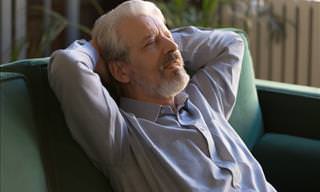1. Older adults should sleep less or more
Not getting enough sleep is detrimental to our energy levels, overall wellbeing, and even long-term health, but many older adults aren't sure just how much shut-eye they need every night. There is a great deal of confusion surrounding this issue, as there are many stereotypes involved. On one hand, some people say that seniors need more sleep because they tend to take a midday nap, but on the other hand, others believe that seniors need less sleep because they tend to wake up so early in the morning.
Both of these statements are stereotypes, and the reasons why both of these tendencies are observed in older adults vary. Poor pain management, underlying health issues, and even medications can all affect your sleep. For example, suffering from arthritis can cause pain at night, and sleep apnea can make you wake up in the middle of the night due to shortness of breath.
Also, the circadian rhythms which predict our sleep-wake cycles may become disrupted with age, which can influence how long and how well you sleep. Therefore, by definition, not all seniors need to nap during the day or sleep more or less every night, but if your sleep is disrupted by your health issues or any other factor in your life, you'll need to catch up during the day. Here are more specifics: according to The Centers for Disease Control and Prevention, people in the age range of 61–64 need 7–9 hours of sleep every night, whereas people older than 65 need 7–8 hours. For comparison, younger adults also require 7 or more hours of sleep every night, so there's no major difference.
2. Dementia and cognitive decline are inevitable

A gradual decline in cognition and other mental faculties are often associated with senior age, but this, too, is but a common misconception. In truth, data by the World Health Organization (WHO) suggests that worldwide, only 5–8% of senior citizens past the age of 60 experience cognitive decline. So, the vast majority of seniors on the planet retain their cognitive abilities.
A similar story is observed in dementia, with US statistics pointing out that 13.9% of Americans past the age of 71 suffer from dementia. Therefore, dementia is by no means a healthy part of aging, and many people in their 90s and beyond live without exhibiting symptoms of this condition. To read more about dementia misconceptions, read on in the article Myths Surrounding Dementia.
That said, if you experience lapses in memory and feel like your thinking is slowing down, it's worth getting checked by a doctor. Health professionals point out that maintaining a healthy diet, an active lifestyle, and treating medical issues helps most people preserve their cognitive health and protects them from dementia.
3. The way you age mainly depends on your genes
Should you "thank" your mom and dad for aging more rapidly than your peers? Medical professionals say "not necessarily", as we tend to give too much credit to the ability of our genes to affect our wellbeing, health, and even our lifespan. So, even if you think that you have poor genetics, don't treat it as a sentence, especially since scientists now know that our habits and lifestyle have the ability to turn certain genes on and off.
The WHO stated, for example, that our lifestyle choices predict over 60% of our health, quality of life, and longevity. Therefore, eating and sleeping well, getting plenty of exercise, not smoking, and limiting alcohol all play a much bigger role in your well-being and longevity than your genes.
4. Seniors should avoid exercise to avoid getting injured

There’s a persistent misconception that muscle and strength building is dangerous or simply ineffective for older adults. Fear of injuries, the need for individual exercise adjustments, and pain often accompanied by chronic conditions all make many seniors believe that exercise will cause them more harm than good, but most doctors and researchers completely disagree with that statement.
Even if going to the gym, doing yoga, or running isn't for you for whatever reason, they claim that you can participate and benefit from some type of physical activity. As the National Institute of Health pointed out in an article, "Exercise and physical activity are not only great for your mental and physical health but can help keep you independent as you age". We even wrote about a recent study, which found that the ability to build muscle isn't lowered due to lack of experience, so even if you start exercising in your 60’s or 70’s, you can build up muscle mass as effectively as an experienced athlete.
5. It’s too late to stop smoking if you’re older
Quitting smoking is difficult at any age, but even more so when you've been stuck with the habit for years. But don't let your brain come up with the excuse that the damage is already done and it's too late for you to quit. “No matter how long you have smoked for and no matter how many cigarettes you smoke a day, your health will start to improve as soon as you quit. Some health benefits are immediate, some are longer-term, but what matters is that it’s never too late,” states the National Health Services website.
Among the immediate benefits of quitting smoking are the improved sense of smell and taste, a decreased likelihood of getting respiratory infections, deeper breathing, and improved blood circulation. After just 1 year of quitting the harmful habit, your risk of a heart attack will be cut by half, no matter your age.
6. Vision and tooth loss is a given
Is your vision going to decline with age? Most people would say "yes", but the truth is that it doesn't have to. You see, the reason why many adults feel like their vision is declining is due to an underlying health condition. As Dr. Alicia Arbaje, a geriatric doctor pointed out in an interview with the Business Insider, common causes of vision loss include "Poor circulation, or diabetes, or high blood pressure or strokes". Interestingly, she further added, "Now, what we do know is that the acuity of your vision can change over time. So the sharpness of your vision, but that is not the same as losing your eyesight."
Therefore, vision loss is hardly a given "symptom" of old age, and neither is the loss of teeth. If you keep up your dental health and hygiene and undergo regular checkups and dental cleaning, there is no reason for you to lose any teeth, really. It's just that many people tend to neglect oral health, especially in their younger years, and that's what's causing long-term dental problems and tooth loss in older age.
7. Forget about learning new things if you're older
Many people mistakably believe that learning and brain development is just for kids and students, neglecting their brain once they reach their late 40's and beyond. While it may be true that learning new information may not be as easy when we're not kids anymore, there's definitely a silver lining. The thing is that older adults learn things once and for all, whereas kids may forget new information much sooner than adults, according to neurological research.
Therefore, learning new skills and information about the world and challenging your brain is always good, no matter your age. In fact, engaging in learning activities and teaching yourself to do new skills may even improve your overall cognitive abilities in the long term.
8. Being lonely and depressed is a natural part of aging
Acknowledging emotional and mental problems is very difficult, no matter your age since there's still a great deal of stigma surrounding issues like depression and anxiety. In addition, you may feel like you don't want to burden family members with your emotional issues and seek often expensive psychological aid, especially if you have an underlying physical condition that's causing the depression to begin with.
Still, it's important not to let your hands down and just submit to feelings of depression and loneliness because they are not a normal part of life at any age. Although maintaining family bonds, keeping in touch with friends, and engaging in social activities can help many people feel better, it's equally as important to recognize when these things are not enough and seek professional help.
9. Weight gain is unavoidable because your metabolism slows down
This misconception stems from a common confusion of two terms - digestion and metabolism. While the speed with which you digest foods can become somewhat slower with time, metabolism (a series of complex chemical reactions that happen on a molecular level to help supply the body with energy and produce different essential compounds to the body) usually stays consistent throughout one's life.
Your metabolism has very little to do with weight gain in most cases, and the real culprit behind those extra pounds is a less active lifestyle according to doctors. The solution is pretty apparent - simply move around more whenever possible and don't neglect exercise.
10. Only women suffer from osteoporosis
Osteoporosis is a condition when the bone tissue gradually changes in structure, becoming more porous, and loses its strength as a result. Although this condition is, indeed, more common among elderly women, it can and does affect a lot of older men, too, which is a problem, because this condition is often believed to only affect women.
The International Osteoporosis Foundation states that about 1 in 3 women past the age of 50 suffer from osteoporosis, but so do around 1 in 5 men in the same age range. Of course, the condition is clearly more widespread among the ladies, but as much as 25% of men will develop it as well. Lastly, if you're a woman in your 50s or older, don't think that you will automatically develop osteoporosis, as 67% of women don't suffer from the disease. To prevent osteoporosis, eat plenty of calcium and vitamin D rich foods, and don't forget to exercise on a regular basis.
Share these myths with friends and family!
 Go to BabaMail
Go to BabaMail


































